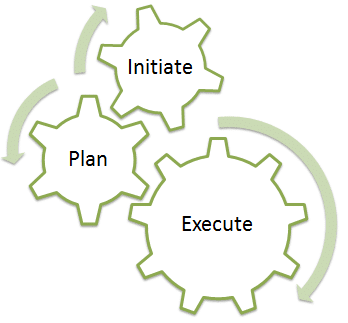Why Your Organization Needs a Project Management Strategy

Have you ever taken the lead on a project that was destined to spin wildly off track? Has your organization ever missed an important deadline?
It’s not uncommon yet, these are a few of the telling signs that it might be time for you to implement a project management strategy.
A poor project management strategy can be deadly to any organization. And to combat this, we are spending more this year on project management tools than ever before as we move from traditional desktop based applications to cloud based project management tools. In fact, project management spend is expected to reach more than $2.8 billion by 2015.
Project management increases effectiveness, lets you delegate tasks and help you plan for risk. It also encourages your team members to communicate regularly and ensures that tasks are evenly distributed based on specific skill sets. And the regular feedback cycle allows for everyone to complete their tasks within the time line.
The Cost of Bad Project management
Research by Carnegie Mellon University in Pittsburgh, PA estimates that almost half of all project budgets are spent on duplicate work caused by improper planning.
Businesses invest a lot of time into training employees in project management and with good reason, as:
- 25-40% of all project spending is wasted to due rework
- 70-85% of project rework happens because of errors in planning
- 60-80% of project failures happen because of poor data analysis and management
Yet projects still fail. A 2012 Business Journal report indicates that the cost of bad project management is as high as $50-150 billion per year.
With numbers like these, it’s in your best interest to get your project right the first time and stay ahead of the competition by delivering top business results.
Project failures are not only expensive but, they can also have negative consequences for the reputation of a company, hindering you from being trusted with future projects when a new product or service is launched.
The Phases of Project Management
It’s not difficult to see why investing in a project management strategy is important. Imagine how much time and money you could save your organization by simply preparing each phase of the project right from the start?
The various phases and processes of project management include:
The first stage of project management lets you set the tone for your project through creating your goals and strategy. Planning involves identifying resources, team members and stake holders and then comes the design, where you determine deliverables and milestones.
Next, your project is ready to execute. As you implement your project strategy, monitoring the project and collecting feedback is essential. By having detailed documentation, it will help you complete your project and prepare you for any future projects.
How to Execute a Project Management Strategy
It’s easy to assume that project management requires a special skill set, but it can be achieved through simple planning. It also requires time spent on thinking and strategy. However, the time you spend thinking at the beginning of the project will save you time as you work towards project completion. It will also differentiate you as a forward-thinking leader.
Before taking on any new project, there are a number of considerations that you need to take seriously. These considerations include:
- Project goals
- Project details, such as timeline and budget
- Resources
- Roles and skills of team members
- Well-defined milestones and deliverables
- Lines and frequency of communication
- Potential project risks
- Collection of feedback
A popular tool used amongst project managers is a Gantt chart. A Gantt chart allows you to organize these considerations into a tangible workflow, and tasks are delegated by time and key person responsible.
Project managers need to understand the importance of each project detail. You will need to take time to organize your project workflow in the initial project stages and by doing so, you will avoid a future path of confusion and chaos.
Good project management helps you analyze and minimize risk from the start.
5 Benefits of Project Management
It’s easy to spot the different between a good project that runs smoothly and a bad project that is poorly managed. A solid strategy, organization and execution will separate you as a respectable leader in the work place.
Project management is more than being a respectable leader. Here are 5 reasons why you need to implement a project management strategy.
1. Increased Overall Efficiency of Your Team. When you delegate tasks, it has a huge impact on the efficiency of any project. Project managers respect that each team member has a unique skill set, rather than assigning tasks at random. This improves efficiency and builds a strong team where everyone feels valued.
2. Project Roadmaps Lead to Better Completion. Taking your project from start to finish is not always a straight forward path. You will run into unforeseen hazards and risks but, an organized project roadmap lets you account for as many of those risks as possible.
And once you set the roadmap. it will also allow for more for more flexibility in your execution of tasks. With the difficult decisions on what to do out of the way, you can now focus on the how.
3. Communication and Feedback Are Valued: In 2013, The Harvard Business Review published a blog post on “The Hidden Indicators of a Failing Project. The article states that if no challenges or conflicts are raised during the project review meeting, it could be a red flag. Team members should be encouraged to frequently communicate and provide feedback.
In the early project stages, project managers need to set expectations for how frequently team members are expected to check in with one another. This ensures that team members can plan ahead and ask questions as needed. Without project management, team members have no long-term vision for the tasks they are expected to complete and each day they may be presented with new work on the fly. Yet with a good strategy, you can easily track and identify progress.
4. Your Organization Will Take Notice. Whether you are a marketing department, IT department or HR, you can tell the different between a well-executed project and one that is shoddily pieced together. Teams within your organization will notice when you finish a project on deadline, and within budget. Better yet, they are more likely to return to you in the future.
5. Quality Leads to Quantity: If you can execute a successful project management strategy once, it will become much easier the second time around. The same phases and processes apply across the board and, you may even learn from past failures. Project management is repeatable and scalable. If it is executed correctly, you will meet your deadlines and be able to take on more work.
When you implement a project management strategy for your organization, you encourage every team member to perform to the best of their abilities. Deadlines, budgets, and any red flags return to your control. Instead of watching your project slip into chaos, a well-executed project management strategy lets you deliver quality, repeatable results.
Get started on the road to project management strategy success with the right set of tools for you to manage your projects with by requesting a demo with Workzone today.
Recommended reading:
Last updated on June 3, 2025




